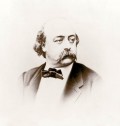Gustave Flaubert

Gustave Flaubert (French pronunciation: [ɡystav flobɛʁ]; December 12, 1821 – May 8, 1880) was a French writer who is counted among the greatest novelists in Western literature. He is known especially for his first published novel, Madame Bovary (1857), for his Correspondence, and for his scrupulous devotion to his art and style.
Flaubert was born on December 12, 1821, in Rouen, in the Seine-Maritime department of Upper Normandy, in northern France. He was the second son of Anne Justine Caroline (née Fleuriot; 1793–1872) and Achille-Cléophas Flaubert (1784–1846), a surgeon. He began writing at an early age, as early as eight according to some sources.
He was educated at the Lycée Pierre Corneille in Rouen. and did not leave until 1840, when he went to Paris to study law. In Paris, he was an indifferent student and found the city distasteful. He made a few acquaintances, including Victor Hugo. Toward the end of 1840, he traveled in the Pyrenees and Corsica. In 1846, after an attack of epilepsy, he left Paris and abandoned the study of law.
Personal life
From 1846 to 1854, Flaubert had a relationship with the poet Louise Colet; his letters to her survive. After leaving Paris, he returned to Croisset, near the Seine, close to Rouen, and lived with his mother in their home for the rest of his life. He made occasional visits to Paris and England, where he apparently had a mistress. Flaubert never married. According to his biographer Émile Faguet, his affair with Louise Colet was his only serious romantic relationship. He sometimes visited prostitutes. Eventually, the end of his affair with Colet led Flaubert to lose interest in romance and seek platonic companionship, particularly with other writers.
With his lifelong friend Maxime Du Camp, he traveled in Brittany in 1846. In 1849–1850 he went on a long journey to the Middle East, visiting Greece and Egypt. In Beirut he contracted syphilis. He spent five weeks in Constantinople in 1850. He visited Carthage in 1858 to conduct research for his novel Salammbô.
Flaubert was very open about his sexual activities with prostitutes in his writings on his travels. He suspected that a chancre on his penis was from a Maronite or a Turkish girl. He also engaged in intercourse with male prostitutes in Beirut and Egypt; in one of his letters, he describes a "pockmarked young rascal wearing a white turban" with whom he had anal sex. He had intercourse with a 14-year-old Maronite boy in 1850.
Flaubert was a tireless worker and often complained in his letters to friends about the strenuous nature of his work. He was close to his niece, Caroline Commanville, and had a close friendship and correspondence with George Sand. He occasionally visited Parisian acquaintances, including Émile Zola, Alphonse Daudet, Ivan Turgenev, and Edmond and Jules de Goncourt.
The 1870s were a difficult time for Flaubert. Prussian soldiers occupied his house during the War of 1870, and his mother died in 1872. After her death, he fell into financial difficulty. Flaubert suffered from venereal diseases most of his life. His health declined and he died at Croisset of a cerebral hemorrhage in 1880 at the age of 58. He was buried in the family vault in the cemetery of Rouen. A monument to him by Henri Chapu was unveiled at the museum of Rouen.
His first finished work was November, a novella, which was completed in 1842.
In September 1849, Flaubert completed the first version of a novel, The Temptation of Saint Anthony. He read the novel aloud to Louis Bouilhet and Maxime Du Camp over the course of four days, not allowing them to interrupt or give any opinions. At the end of the reading, his friends told him to throw the manuscript in the fire, suggesting instead that he focus on day-to-day life rather than fantastic subjects.
In 1850, after returning from Egypt, Flaubert began work on Madame Bovary. The novel, which took five years to write, was serialized in the Revue de Paris in 1856. The government brought an action against the publisher and author on the charge of immorality, which was heard during the following year, but both were acquitted. When Madame Bovary appeared in book form, it met with a warm reception.
In 1858, Flaubert traveled to Carthage to gather material for his next novel, Salammbô. The novel was completed in 1862 after four years of work.
Drawing on his youth, Flaubert next wrote L'Éducation sentimentale (Sentimental Education), an effort that took seven years. His last complete novel, it was published in 1869.
He wrote an unsuccessful drama, Le Candidat, and published a reworked version of The Temptation of Saint Anthony, portions of which had been published as early as 1857. He devoted much of his time to an ongoing project, Les Deux Cloportes (The Two Woodlice), which later became Bouvard et Pécuchet, breaking from the obsessive project only to write the Three Tales in 1877. This book comprised three stories: Un Cœur simple (A Simple Heart), La Légende de Saint-Julien l'Hospitalier (The Legend of St. Julian the Hospitaller), and Hérodias (Herodias). After the publication of the stories, he spent the remainder of his life toiling on the unfinished Bouvard et Pécuchet, which was posthumously printed in 1881. It was a grand satire on the futility of human knowledge and the ubiquity of mediocrity. He believed the work to be his masterpiece, though the posthumous version received lukewarm reviews. Flaubert was a prolific letter writer, and his letters have been collected in several publications.
At the time of his death, he may have been working on a further historical novel, based on the Battle of Thermopylae
 čeština
čeština Deutsch
Deutsch français
français magyar
magyar polski
polski русский
русский English
English Azərbaycan
Azərbaycan беларуская
беларуская italiano
italiano ქართული
ქართული қазақ
қазақ Nederlands
Nederlands português
português slovenčina
slovenčina español
español 中文
中文 українська
українська










